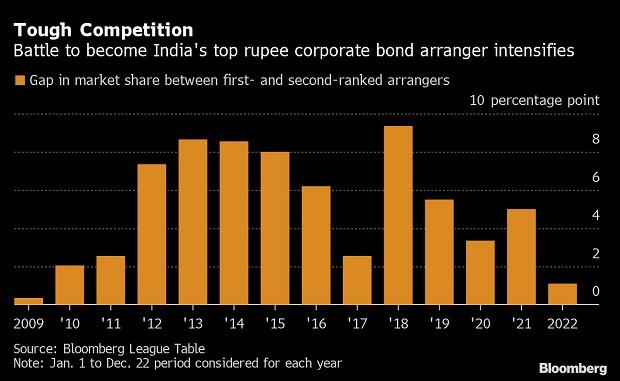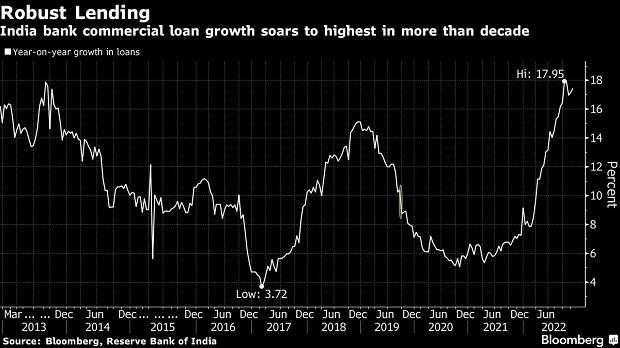Top Indian banks battle for no 1 bond spot as credit demand surges
Competition among India’s biggest local-currency bond arrangers has heated up to the most intense in 13 years, as credit growth stronger than in many other major economies spurs more rupee debt offerings.
Indian businesses are hungry for credit, despite rising interest rates, as they borrow to cover higher operational costs and for more investments. Corporate bond sales also got a boost this month from record issuance of riskier debt by banks to buffer their capital and allow more lending.

Axis Bank Ltd., which has been the No. 1 corporate bond manager for each of the last 15 years, is leading again in 2022 after managing 18.8% of the note sales, followed by HDFC Bank Ltd. at 17.7%, according to data including self-led deals compiled by Bloomberg. The gap in market share between this year’s first- and second-ranked arrangers is the lowest since 2009 and narrowed this month after HDFC Bank sold India’s biggest-ever rupee Tier 2 capital note at 150 billion rupees ($1.8 billion).
While growth in India is slowing under pressure from inflation and higher rates to tame it, as in many parts of the worlds, the economy still expanded at 6.3% in the most recent quarter, and services data released this month pointed to resilience. Commercial lending growth at banks accelerated in December to 17.45% over the year-earlier period, just under a decade-high touched in October, according to central bank data.
Spokespeople at HDFC Bank, India’s largest private lender by market value, and Axis Bank, the fourth-biggest on that measure, weren’t immediately able to comment.

Rupee corporate bond sales have increased 3.7% so far this year to 8.67 trillion rupees, bucking a global decline in company note offerings, as Indian firms favored funding in their home market amid a bigger jump in dollar borrowing costs.
Rupee corporate bond yields came off their year-to-date highs this month, amid signs that inflation may be cooling. Ajay Manglunia, head of institutional fixed income at JM Financial Ltd., expects rupee note issuance to rise next year after bank lending rates climbed higher than funding costs in the bond markets, following an initial lag.
 Loan, Personal Loan, Home Loan, Business Loan,Loans in India Loan in India, Personal Loan, Home Loan, Business Loan, Loans in India,Loan Finance,Loan in India, Get Instant Personal Loan,Home Loan, Business Loans in India
Loan, Personal Loan, Home Loan, Business Loan,Loans in India Loan in India, Personal Loan, Home Loan, Business Loan, Loans in India,Loan Finance,Loan in India, Get Instant Personal Loan,Home Loan, Business Loans in India